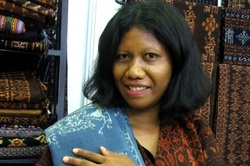
| Thu, 06/17/2010 8:56 AM | People
Many take for granted the work of elderly kampung women who spend their lives weaving traditional ikat cloths, but Alfonsa Horeng sees them as heroes, and has dedicated her life to taking them to the forefront of textile art.
“Many people perceive these women as nobodies, and what they do as nothing,” says Alfonsa of the women living in Flores, East Nusa Tenggara. “But our traditions, in the hands of these women, has been preserved. We should thank them.”
Alfonsa does more than just thank the women — she left a promising job in the big city of Surabaya, East Java, to bring them together and encourage them to continue weaving, a dying tradition.
Through the Lepo Lerun Woven Center she established in 2003 in the Nita district of Sikka regency, she reached out to around 400 women from 14 villages and created global opportunities for the ikat, promoting the precious cloth from one country to another.
“It’s not easy to convince these women to continue weaving, as they also have to make ends meet,” says the 36-year-old woman. “Many women would prefer to work on farms, or do something else to earn a living.”
Of course, Alfonsa goes on, she initially grabbed the women’s attention by mentioning that woven cloths could be a source of income, and that she could help them sell their cloths to other regions and countries. And slowly but surely, she made all the women fall in love with weaving.
“I’m appealing to their souls [by telling them] that money never lasts forever,” says Alfonsa, who received an AusAID fellowship program from the Australian government in 2008. “Weaving is not about money, but preserving our local traditions,” she adds.
It wasn’t easy at the beginning for Alfonsa to carry out her mission, as she faced — and still to this day —one big challenge: modernization. Nowadays, most people in Flores couldn’t care less about the weaving tradition, especially the younger generations.
“Weaving isn’t something they’re proud of — they think it is not trendy,” says Alfonsa, who helped her mother weaving during her teens. “Our youth think it’s way cooler to work in big cities such as Jakarta. Or, they prefer pursuing careers deemed more fashionable, for instance going for state official jobs.”
Moreover, “Who would want to wear ikat? People nowadays prefer wearing comfortable, everyday clothes,” she says.
Faced with these obstacles, Alfonsa knows she has to take small steps to reach her objective. She has embraced old to middle-aged women, in the hope they will pass on their love of weaving to younger members of their families. She also made a breakthrough promoting organic woven cloths to the women, thus inspiring them to create ikat with a high value.
“I had heard so much about how our great grandmothers used to make natural dyes from plants such as mango, mengkudu [noni], indigo and turmeric,” says Alfonsa, who graduated from the School of Agricultural Technology at the Catholic University of Widya Mandala in Surabaya in 1998. “So I thought, why not revive this knowledge? We can benefit from what we already have around us, and contribute to the environment at the same time.”
In 2003, Alfonsa tasked four women with researching natural dyes. After many trials and errors, the women found formulas for colors, and started to make their organic woven cloths.
“At first, everyone thought I was mad to give them such an assignment,” Alfonsa laughs. “But I didn’t care if they called me crazy or whatever. I knew I had to do this.”
And they succeeded, she says. They now plant their own cotton trees as well as make their own weaving thread. “I want these women to be independent. We want to create ikat cloths that are 100 percent made from our land — from basic material like cotton to the natural dyes.”
Of course, Alfonsa says further, she and her friends also create woven cloths with synthetic dyes, to cater to the demands of the market. But what remains at the heart of her and her friends’ effort, is initiating something new among them.
Today, Alfonsa and her friends’ woven cloths have achieved national recognition, with many famous designers using them in their creations.
“Designers such as Samuel Wattimena, Ghea Panggabean, Stephanus Hamy and Liliana Lim are among those who use our ikat,” Alfonsa says. “From my observation, many high-class socialites get bored with the same old stuff they can easily find in malls and look for something unique. That’s why they love our ikat.”
Alfonsa and her friends’ cloths have also gained international recognition with Alfonsa often showcasing their ikat while traveling overseas. Her first opportunity came two years ago, when she attended the AusAID’s Gender, Good Governance and Leadership program at the University of Adelaide for three months. At that time, she brought her woven collections to show them around universities and schools across Australia, as well as to the Heritage Culture Group and the National Gallery of Australia.
“I made presentations and workshops; I taught students and the public there to weave,” says Alfonsa, who’s now focusing on campaigning to promote ikat in Australia and Germany. “I felt so proud to see how people from other nations adore our heritage,” she adds.
Although she travels a great deal outside East Nusa Tenggara — and Indonesia — Alfonsa can’t wait to return to her home in Flores. Meeting with the elderly women, and documenting the rare ikat motifs from one village to another, she says, is her true calling.
“I remembered what my father always said: ‘never leave the land your great grandfathers inherited to you, and develop it for a good cause,” Alfonsa recalls. “That local wisdom was what convinced me to leave my career in the big city and return home to develop Flores.”
http://www.thejakartapost.com/news/2010/06/17/alfonsa-horeng-weaving-tradition%E2%80%99s-future.html
